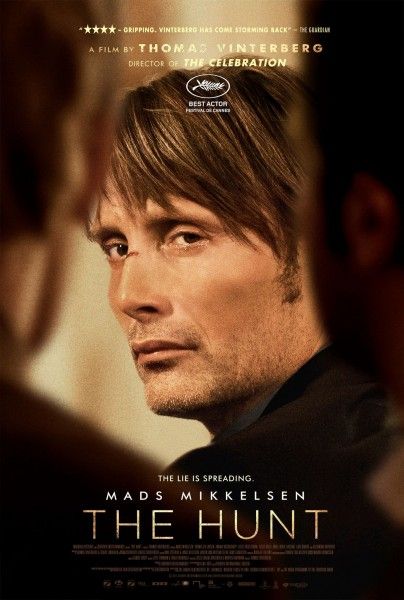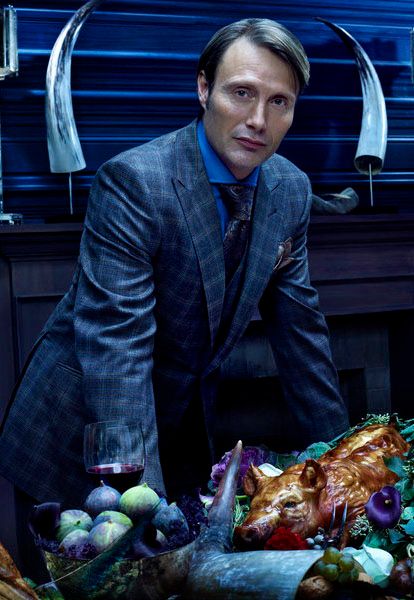Directed and co-written by Thomas Vinterberg, The Hunt is a disturbing and unsettling depiction of what happens when a lie becomes the truth, igniting a witch hunt that threatens to destroy and innocent man’s life. Lucas (Mads Mikkelsen) has been forced to start over after a tough divorce, but just as things are looking up, his life is shattered and he is forced to fight for his life and dignity.
During this exclusive phone interview with Collider, actor Mads Mikkelsen talked about why The Hunt appealed to him, wanting to work with filmmaker Thomas Vinterberg, being as honest as possible on screen, how exhausting this role was, working with the kids in the film, and how proud he was to win Best Actor at the Cannes Film Festival in 2012. He also talked about why he ultimately chose to play Hannibal Lecter in NBC’s Hannibal, how Hannibal’s love life worries him a bit, the experience of making the Western The Salvation, how he hopes to work with filmmaker Nicolas Winding Refn again soon, voicing a character for Kung Fu Panda 3, and what makes him either take or refuse a role. Check out what he had to say after the jump.
How did you get involved with this film?
MADS MIKKELSEN: Denmark is a small place. We all know each other. Thomas [Vinterberg] and I have known each other for many years, on a surface friendly basis, but we’d never worked together. He had this film and he called me and said, “I would love to work with you. Would you mind reading this script?” Obviously, I wanted to work with him because I think he’s done some brilliant things. And when I read the script, I was absolutely not in doubt. It was a beautiful and heart-breaking and very frustrating thing to read. I was enchanted, right away.
When you take on something with subject matter like this, do you think it’s important to do so in a way that is so unflinching and doesn’t sugar coat things, at all?
MIKKELSEN: Yeah, I definitely do. I would have turned it down, if it had turned into a thriller. I would have seen no point in a thriller here. I don’t need to entertain people, on top of what we were doing. It’s not a question of whether he did it or not. I would have thought that was banal and uninteresting, and I wouldn’t care. And it could have also turned into a shoot-out because there were a lot of guns in the film. I think it has to be as pure and as clean as possible, when you’re dealing with a story like this. I think we are serving the best purpose to make it as clean as possible.
The fact that this man didn’t do what he’s being accused of is pretty clear, but this film doesn’t really give a definitive closure to the story. Were you okay with that? Did you come to your own conclusions about the ending?
MIKKELSEN: For me, it was just important to know whether he did it or not. As you say, you can unquestionably see that he hasn’t done it. You see why the little girl is doing what she’s doing. You understand everything. And that was very important for me to know. If it was the other case and he had done it, I would have still done the film. I just would have made sure that we knew he had done it, and show it from the other angle. The finish of the film is obviously a metaphor, or it can be real. But, in the scene just prior to that one, where his son is getting handed this rifle, he’s looking over at all of his friends. It’s the only stylistic scene in the film. They’re all looking at him in strange ways that are unreadable. You can’t read what they are thinking. And then, it snaps back to the party and his son gets his rifle and it’s all good. But, that is the moment where he realizes that this is not going to happen. He can’t stay there. It doesn’t matter how much they try to accept him. They will never be able to accept him, fully. That is obviously the shot at the end. It’s the icing on the cake, in the sense that he can’t stay there. He’s gotta move on.
The fact that this film doesn’t have a clear-cut ending makes it very compelling and unsettling. If this same film were made in America, the ending would have most likely had to have been more clear and better explained.
MIKKELSEN: I do read some of the scripts from America and, even though the themes or subject of the film is very interesting, and some of the scenes are very interesting, there is a tendency that they have to explain everything. There will be no dilemma. This guy was evil, and this girl was very sweet. And in the end, we’d have to see eight endings because we’d also have to know what happened to the uncle. It’s like, “Are you kidding me?!” That’s not what this film is about. This is the same story, told again and again. It just takes something away from reality, and it often takes something away from the beauty of a single story.
This is a movie where you’re on screen for almost every moment and its overall success really depends on your believability. Did that feel daunting to pull off, or was this a man you easily identified with?
MIKKELSEN: I like films like that. It enables us to go and say to an audience, “Would you please come to me, instead of me jumping up to you, constantly?” I’ve done a couple of films in the same nature, but not with the same theme. The second Pusher film is very much like that. I like it. I don’t hesitate and go, “Oh, my god, can I fill it out?” I understood this character. If I do my very best then the camera and the audience will follow me, and eventually they will somehow feel like I feel. I don’t have to show it to them. I don’t have to speak it out loud. I don’t have to do, as you say, the American way of winking to the audience with the eye. I have to do it as honest as possible. The film will help me, and the audience will hopefully follow me. If that doesn’t happen, then I don’t know what to do. I’m against being aware that there is an audience. If the actor starts believing there is an audience, he will do something that is unbelievable, in a film like this. With other films, you can do it, but not with this film.
Even though, mentally, you know that you’re acting, your body doesn’t is being faked out, physically and emotionally. Do you find it hard to be in such a challenging emotional place all day, and then turn it off and go home, or are you able to have moments of levity on a film like this?
MIKKELSEN: It’s a fragile balance. I’m not the kind of actor who runs around and insists on being called Stravinsky by everybody, and my family has to call me Igor. I’m not that kind of actor. I think that’s pretentious. But obviously, if you are in a character for 11 or 12 hours, and we’re doing a scene like the scene we did in the church, where I was breaking down for 12 hours and confronting my friends for 12 hours, it’s exhausting. So, you don’t go jumping around, right after, because you’re exhausted and there is a depression inside of you that you have to shake off, somehow. But I’m not like, “Oh, it’s such a tormenting job, and I have to be alone for five days.” I try to get rid of it, as fast as I can. You also have to remember that, if you nail a scene like that one, and I think we did nail it, it gives you a certain amount of energy, as well. You become happy that you nailed it, no matter how sad the scene is. I think that helps you. It’s much worse to make a cheerful scene that doesn’t work. That will haunt me for a month.
What was Thomas Vinterberg like, as a director?
MIKKELSEN: Thomas is a very specific director. He knows what he wants to do and he knows what the scene is about, and he will tell you what he wants for a scene. Once he does that, and we understand that we’re going from A to B, then he also gives you a lot of liberty to come up with other things that might solve the scene in a better way. So, he’s very precise, but he’s also very open to giving us our freedom.
What was it like to work with all of the kids in this film?
MIKKELSEN: They’re all good. That’s thanks to the great casting they did with the kids. I also take great pride in being able to make kids feel comfortable on the stage. If you’re 15 years old, you obviously know who I am, and that can be quite intimidating for a young man. My job is to take that intimidation away and remove that wall, so he just finds me like a dad – kind of funny, but also very annoying. It’s my job to make them feel comfortable and make them feel at home. And then, they can do what they were picked to do and were good at. They need to feel free to act, but they need to feel comfortable, before they can do that, so that’s a big part of my job.
When you bare yourself so emotionally for a film like this, does it make you extra proud when you get recognition, like winning Best Actor at Cannes, or are awards just surreal for you?
MIKKELSEN: We’re prepare for any part, as much as we always do. But, I’m really proud of this film and being proud of this film, I was extremely proud of getting that award. I think the film deserved that award. If not me, the film did. You can only be as good as the film is, so Thomas deserves at least half of it. I was very proud. Awards mean absolutely nothing, if you don’t get it. If you do get it, they’re the best thing in the world.
You’ve done fantastic work on Hannibal, and it’s been fascinating to watch that character be both charming and chilling. One of the things that made people most nervous about that show is the actor that would end up getting cast as Hannibal Lecter and how they would play the character. Did you hesitate, in taking on that role?
MIKKELSEN: Oh, very much so. I don’t know anyone who wouldn’t, for obvious reasons. [Anthony Hopkins] has done it a couple of times, to perfection. The only thing that swayed me was that this is before he was captured. He’s a man who’s out there, in the real world, and he’s making friends. It humanizes him. Whatever evilness he has inside of him, we will see in his private moments. I cannot sit there and be evil, and wink to the audience. We have to believe that these two cops didn’t see it. If the audience sees it, the cops will see it. We had to have that fragile balance. Because it was a different nature, we could get away with it. I thought it was an interesting challenge that, at least for the first season, we didn’t have to step directly into the shoes of Anthony Hopkins.
Bryan Fuller said that one of the things he’s looking forward to, in future seasons, is exploring what a romantic relationship with Hannibal would look like. Is that something you’re curious about, or does that worry you a bit?
MIKKELSEN: That worries me, a little bit, to be honest. We have seen small little crushes. One of the crushes is with Alana Bloom (Caroline Dhavernas). There’s that scene where he’s making roses out of tomatoes, and she doesn’t even see it. She’s just shuffling carrots on top of it. And for a split second, Hannibal wants to eat her. But, he’s also in love with Will (Hugh Dancy), in a different way. He’s also in love with the young girl. And he’s also, to a slight degree, in love with Jack Crawford (Laurence Fishburne). Hannibal is a strange man. I’m not sure if I want to see explicit sex scenes with him. That could be very scary. But, he’s a strange character. He loves a lot of things. He has a lot of empathy, but he is controlling his empathy. That his, of course, what makes him the Satan he is.
How was the experience of making The Salvation?
MIKKELSEN: I was an average Western fan, when I was a kid. I saw some Westerns, but I was never a geek. But once I got dressed up, and had the hat on and had the revolver on the side, that was cool. That felt right. We all became little kids again. It was really, really fun, being part of that universe.
You’ve also done some compelling work with Nicolas Winding Refn. Is he someone you would like to collaborate with again, at some point?
MIKKELSEN: Of course. We’re bound to do it again. I think we do have some plans, I just don’t know exactly when. We have to work together again. Hopefully, it will be with Ryan Gosling, as well, so that we can be the Three Musketeers.
Are you going to be voicing a character for Kung Fu Panda 3?
MIKKELSEN: I think I am. They asked me to, almost a year ago. As far as I understand, it takes them a couple of years to do the production, and then they’ll call us back. I have to wait to see what happens, but that’s going to be interesting.
What is it that makes you take or refuse a role? Do you have any criteria, or is it instinctual for you?
MIKKELSEN: There’s a lot of instinct going on. But, the criteria is that I would love to have some kind of dialogue or communication with the director. I need to understand that we can communicate and that we like communication. That’s something I have to have a strong feeling about. Secondly, I have to find the script intriguing or interesting. I don’t have to understand the whole script, but I do have to find it intriguing. If those two things are present, that would probably be a yes.
The Hunt is now playing in theaters.



